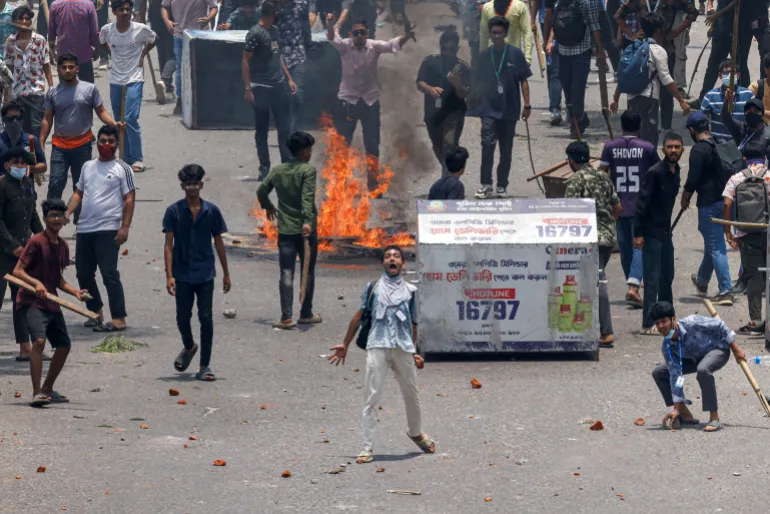I want justice
I’m Tanjim Chowdhury, an artist and student from Bangladesh, currently living and studying in France. The ongoing turmoil in my home country fills me with a deep sense of helplessness and shame. The political situation in Bangladesh has reached a boiling point, with student protests and demands for a merit-based system being met with violence and repression. In this post, I express my solidarity with the students and delve into the context and consequences of their struggle.
The Escalation of Protests
The student protests in Bangladesh began weeks ago, but the violence escalated dramatically at the start of this week. Student protesters were attacked by activists from the Bangladesh Chhatra League, the student wing of Prime Minister Sheikh Hasina’s Awami League party. This aggression came in response to the students’ demands for a merit-based quota system for government jobs, a demand rooted in the widespread frustration with the existing system.

The Quota System Controversy
The Supreme Court of Bangladesh recently scaled back the quota system for government jobs after it led to nationwide unrest and deadly clashes between police and protesters. Previously, 30% of government jobs were reserved for the families of veterans from the 1971 war of independence against Pakistan. The court’s decision now mandates that 93% of government jobs be allocated on a merit-based system, leaving 5% reserved for the children of independence war veterans and 2% for other categories.
Government’s Heavy-Handed Response
In an attempt to quell the protests, the Sheikh Hasina government imposed a nationwide curfew, which has been extended until 3 pm on Sunday. The police have been ordered to “shoot on sight” to suppress the demonstrations, leading to a mounting death toll that now stands at 114. Only emergency services are permitted to operate, and public holidays have been declared for Sunday and Monday.
A Catalyst for Outrage
The protests intensified following a controversial statement by Prime Minister Hasina on July 14, where she questioned if the grandchildren of Razakars (collaborators during the 1971 war) should benefit from the quota system if the grandchildren of freedom fighters do not. This remark ignited further outrage among the youth, who are already grappling with high unemployment rates. With nearly 32 million people out of work or education in a population of 170 million, the demand to abolish the 30% reservation for war veterans’ families has gained significant traction.
The Human Cost of the Protests
The protests have had a severe human toll. Six people were killed, and hundreds were injured in clashes this week alone. The government’s decision to close all universities—epicenters of the movement—has not deterred the students. Instead, it has led to a tense standoff, culminating in deadly violence on Thursday. In Dhaka, thousands of students clashed with armed police, resulting in over 100 fatalities, including a bus driver and several students. The AFP news agency reported 39 deaths this week, with local media confirming at least 28 deaths as of Thursday.
A Nationwide Curfew and Its Implications
In response to the escalating violence, Bangladesh has enforced a nationwide curfew, deploying military personnel and police to patrol the streets of Dhaka. The death toll continues to rise, with hospitals across the country reporting numerous casualties. The Dhaka Medical College Hospital received 27 bodies on Friday alone, pushing the death toll to 114.



A Message to Prime Minister Sheikh Hasina
As an artist and a student, I am compelled to address Prime Minister Sheikh Hasina directly. Honorable Prime Minister, although you lost the merit to be addressed as “honorable” long ago, today, blinded by the arrogance of power, you have lost all sense of right and wrong. You have forgotten that 15 years ago, you came to power through the overwhelming votes of the common people of Bengal, not just through the votes of your sycophants.
You have broken your promises, and the sympathy you garnered by capitalizing on the emotion of losing your loved ones has turned into widespread pain for the people of Bengal. The tears you shed over your family’s loss have become a farce, and your actions have belittled your father and your entire family. You, who mourned for Russel, have become the murderer of thousands of Russels.
If you truly respected the liberation war and its freedom fighters, your regime would be free of corruption. No helpless, crippled freedom fighter would have to beg, nor would any freedom fighter have to bribe for their allowance. Fake freedom fighters wouldn’t get the chance either.
Your experience and wisdom are evident, yet you fail to apply them correctly. How much more bloodshed and humiliation will satisfy your lust for power? When will your thirst for power and blood be quenched?
Conclusion
The situation in Bangladesh is dire, and the student protests are a testament to the frustration and desperation of the younger generation. They demand justice and a merit-based system, and their voices should not be silenced through violence and repression. As a Bangladeshi living abroad, I stand with them in their fight for a fairer future.


Leave a Reply